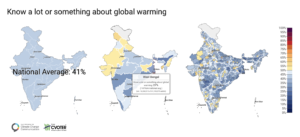Physical Address
23,24,25 & 26, 2nd Floor, Software Technology Park India, Opp: Garware Stadium,MIDC, Chikalthana, Aurangabad, Maharashtra – 431001 India
Physical Address
23,24,25 & 26, 2nd Floor, Software Technology Park India, Opp: Garware Stadium,MIDC, Chikalthana, Aurangabad, Maharashtra – 431001 India

India is highly vulnerable to climate change impacts. As a key player in global climate negotiations, India has implemented various national and state-level policies to improve energy efficiency, develop clean energy, and prepare for climate impacts. About 33 states and Union Territories have launched state-level climate action plans. A recent survey shows major concerns about climate hazards: severe heat waves, droughts and water shortages, severe cyclones, and floods.
While past studies have focused on national responses to climate change, detailed insights into regional variations have been limited. The Yale Climate Opinion Maps for India have been introduced to address this. This innovative tool provides estimates of public responses to climate change across 34 states and Union territories, and in 604 districts, highlighting variations in global warming knowledge, beliefs, risk perceptions, and policy preferences at state and local levels.
Key Findings
Large majorities of Indians in all states and districts are concerned about global warming. Majorities in every district believe global warming will lead to more severe heat waves. Additionally, majorities in 98% of districts think that India should reduce fossil fuel usage in the future.
Nationally, 41% of Indians report knowing a lot or something about global warming, but this varies significantly by region. In Gujarat, 52% are knowledgeable about global warming, while only 33% in Maharashtra report the same. State capital residents generally have more knowledge compared to those in other districts.
Given a brief definition of global warming, 82% of respondents believe it is happening, but only 54% attribute it mainly to human activities, highlighting a gap between public understanding and scientific consensus. Variations exist, with 68% in Thiruvananthapuram, Kerala, recognizing human causes, compared to 43% in Kheri, Uttar Pradesh, the study says.
Climate change impacts people worldwide. In the U.S., 44% report personal experience with global warming, while in India, 78% do, with state-level variation from 90% in Haryana to 49% in Andhra Pradesh. Northern Indians are more likely to report personal experiences than those in southern states.
Risk perceptions of global warming harms are consistent across states. Nationally, 85% of Indians are worried about global warming, and 74% believe it will worsen heat waves. More people in Kerala, Goa, and Punjab perceive risks compared to those in Karnataka and Tamil Nadu, the study says.
Climate change impacts vary across India. Drought is common in the northwest, flooding in the east, and cyclones, drought, and flooding in the south. Majorities in all states believe global warming will intensify severe cyclones, droughts, and water shortages. Additionally, 70% see risks of plant and animal extinctions, and 64% foresee more famines and food shortages. Nationally, heat waves are a major concern, but in states like Punjab, flooding is a greater worry (80%).
The study shows that there is widespread support for transitioning to clean, renewable energy in India. Nationally, 58% of Indians believe the country should reduce fossil fuel use, with majorities in all but 16 districts. Similarly, 59% support increased use of renewable energy, with variations across regions. Support for reducing fossil fuels is lowest in Andhra Pradesh (37%) and highest in Haryana (70%), which faces severe air pollution. Renewable energy support is highest in Goa and Kerala (72%) and lowest in Assam (41%).
Understanding public knowledge, beliefs, risk perceptions, and policy support regarding climate change is crucial for decision-makers. As Indian states develop or update their State Action Plans on Climate Change and Net Zero targets, engaging and understanding the public is essential for effectively implementing climate solutions.
References: https://climatecommunication.yale.edu/publications/climate-awareness-india/
Comments are closed.
벼룩시장 구인구직 및 신문 그대로 보기 (PC/모바일) | 구인구직 앱 어플 무료 설치 다운로드 | 모바일 벼룩시장 보는 방법 | 벼룩시장 부동산 | 지역별 벼룩시장 | 벼룩시장 종이신문 에 대해 알아보겠습니다. 섹스카지노사이트